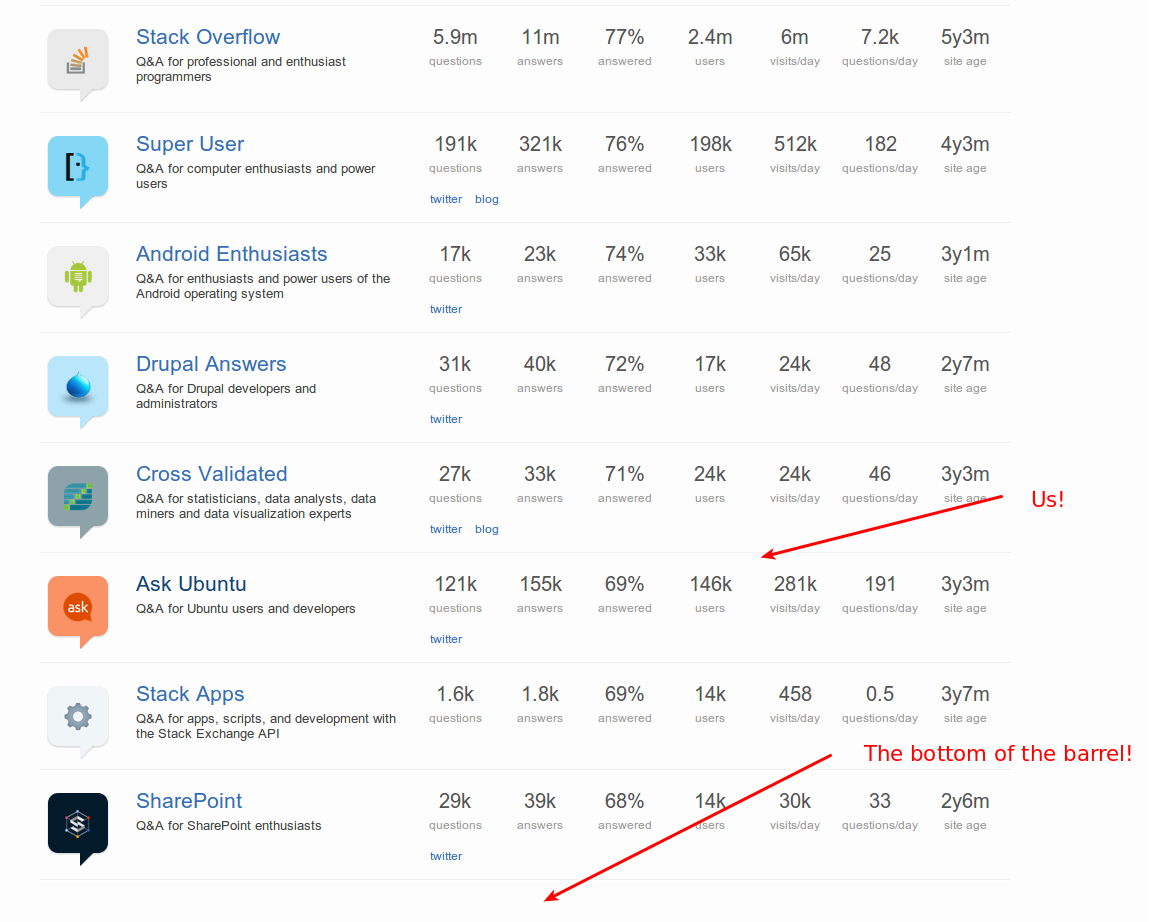In the fashion of the discussion on meta.SO about unanswered questions on Stack Overflow
Currently, out of 120,000 odd questions, only about 70% of them are considered answered. But it wasn't this bad some time ago. Last year, after our cleanup event, our answered rate went as high as 86%. And that stat has been on the downfall ever since.
Here's some number crunching to get the idea:
Percentage of open questions with answers, by quarter
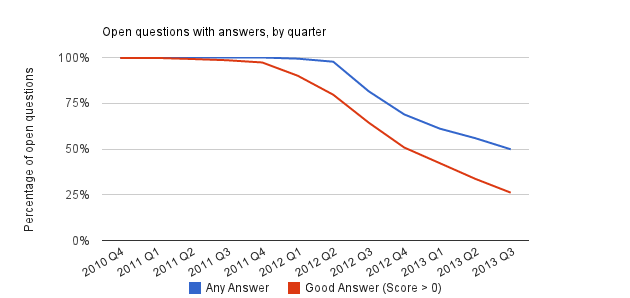
The number of questions we get have significantly increased since 2012 but the answers haven't caught up with them yet. Actually, they are not even trying to catch up.
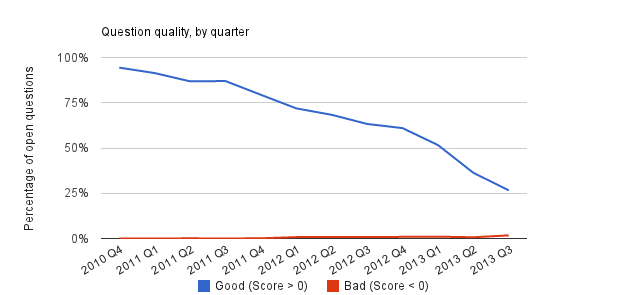
Likewise, the number of questions that have received at least one vote have been on the decline as well. But there haven't been much increase on downvoted questions. I think votes should be used to quickly sort good content to the top and bad content to the bottom. If we are to club decent quality questions with poor quality content by not voting on either of them, we are doing no justice to the system. Anyway, that probably should be raised in a separate discussion.
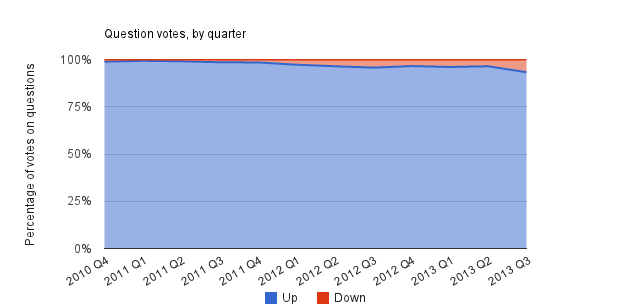
People predominantly prefer to upvote questions or not vote at all. Just 6% of the votes are downvotes. Maybe we shouldn't be so averse to the downvote button.
Now that I have established all of that, what we can do about the unanswered questions? Should we be concerned yet?
Me being a little concerned about the state of the site, I have a few ideas that I would like to throw here for discussion. You are strongly encouraged to brainstorm a few more ideas and discuss the validity of the ideas raised here. The answer section is open for all.
Enforcing a stricter policy on content quality
I believe we should consider actively putting questions that don't have adequate details and information that are needed to provide a satisfactory answer "on hold". Historically, we were quite lenient on questions that didn't have enough details and didn't close them right away on the hopes that OP would edit the details in.
But this workflow is horribly broken and more often than not, that's exactly what is not happening. Questions lie around on the site for months together without enough information to answer them. And OP will not be active either. Maybe we should start to put them "on hold" first and then reopen them when they have enough details. This workflow should work better since the system now automatically adds recently closed and edited questions in the reopen queue.
Restricting the asking privileges to registered users
I think this little tweak to our system would do a world of good. For a start,
- it would keep away a decent chunk of spam posts
- prevent drive-by users from posting their questions and then fleeing the site
- tremendously decrease the chance of a user losing access to their cookie-based accounts thereby avoiding anonymous edits from OP or non-answers posted by OP from another account to provide further information.
Downvoting incomplete questions so they fall to the bottom
This probably would help on multiple folds.
- Bad questions will be eventually auto-deleted from database
- Good questions would be better sorted from junks making it easier for answerers to focus on them
- Improves the overall quality of content on the site
Now, if you are one of those good people not comfortable with downvoting questions because "it is not the right/best/kind/nice thing to do", I think we should start putting the best interests of the community first instead of sacrificing the community at all.
Inviting and encouraging 'experts' to answer questions
It is a known secret that most of the questions we receive right now are either very mundane or highly specific. Maybe all we need is more people in each of the specific field answering those questions.
Let me end of with another data query showing how askers compare with answers..
Number of users answering or questioning
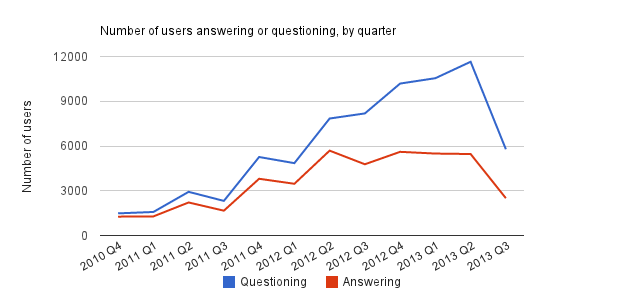
Answering Oli's concerns.
jokerdino's first three suggestions have problems:
- Our existing policies stipulate quality... People ignore policy.
- Forced registration won't float with SE and doesn't solve the problem of people asking bad questions.
- Downvoting is just another way of cleaning. It's still time taken from members to review something.
We should always be trying to attract people in.
People may ignore policy. But that's not an argument for never enforcing one. Skeptics.SE expects a remarkably high standard (in comparison with the rest of Stack Exchange network sites) from their users and the general quality of the posts over there would tell you the fruits of enforcing such a quality policy.
Forced registration is not a new concept, not to Stack Exchange. Stack Overflow has it for a long time and Programmers.SE has required registration for quite some time now. And no single solution will overnight solve the problem of people asking bad questions and requiring registration will help prevent people easily losing access to their accounts and questions. This will be beneficial especially with mods no longer being able to merge user accounts at our discretion.
Now I am not sure why we are so averse to any form of cleaning. Downvoting is a form of cleaning (actually, I would call it sorting) and that's pretty much the reason why it's even there. And downvoting will help highlight good content. It may take some time from the reviewers (realistically speaking, voting costs you may be 10 seconds but the benefits are far reaching) but it will definitely help signal to the general audience that a post is not great.
When we are getting 180+ questions on average everyday, I am sure we can afford to keep some of the questions away. It is as much about keeping our community happy and healthy as it is about getting more people in.

